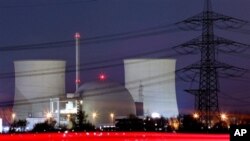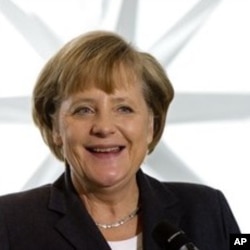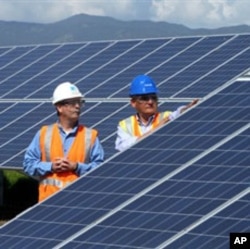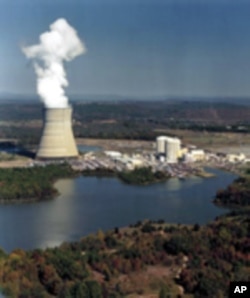The Fukushima Daichi nuclear plant meltdown in March along with domestic political pressures prompted German Chancellor Angela Merkel to abandon nuclear energy in favor of renewable sources.
With eight nuclear power plants already shut down, Germany plans to phase out all 17 by 2022.
The German government intends to replace atomic energy with solar, wind and hydroelectric power.
The implications for Europe are enormous. The Swedes are worried about an increase in electricity prices across Europe and the French government claims that there is no way that the EU can meet its emission cutting targets without at least some use of nuclear power.
Nonetheless, Merkel hopes that countries will follow Germany’s lead.
Speaking on VOA’s Encounter, Steve Kerekes (left photo), Senior Director of Media Relations at the Nuclear Energy Institute told host Carol Castiel that Germany must prepare its citizenry and businesses to pay for the phase-outs, involving national security, energy and economic growth costs. “You cannot run a modern industrial economy on power sources that have that type of capacity. If you want to do it, as the Germans are going to find out, you just better be ready to pay for it,” says Kerekes.
On the other hand, Arne Jungjohann (left photo), Director of the Environment and Global Dialogue Program at the Heinrich Böll Foundation, explains that although the nuclear phase-out and transition to renewable energy sources would entail a cost increase to taxpayers, it would be modest. “The majority of people say they’d rather pay a little bit more on electricity,” says Jungjohann.
Given Germany’s high population density and its relatively small geographic size, Jungjohann believes the risk of something happening with any of the 17 nuclear power plants would result in an environmental catastrophe.
Jungjohann asserts that investing in renewable energy sources will pay off for Germany. “It’s a very exciting movement because on the one hand, you create these new jobs… solar manufacturing plants or wind turbine makers, on the other hand you create new jobs in very traditional industries… So German steel workers work a lot for the wind industry to produce these plates,” says Jungjohann. He predicts long-term success with this dual strategy of creating jobs in the green sector as well as in the industrialized sector where there is constant growth.
Arne Jungjohann and Steve Kerekes sparred over the inherent risks and benefits of nuclear power.
Jungjohann believes that nuclear power has hit its peak in Germany. “We see now that it’s [nuclear power] quite risky, it is quite dirty, we don’t know what to do with the waste…and overall it doesn’t seem to be competitive in terms of its economics,” says Jungjohann.
Conversely, Kerekes deems that in the long term, the benefits of nuclear power outweigh its risks. He quotes US epidemiologist John Boice who says that the health effects from the Japanese disaster “should be thankfully minor because of the protective actions taken…Radiation is very easy to detect…that makes things easier and the impact to the populations outside Japan will be negligible to nonexistent,” cites Kerekes.
As for the United States, Kerekes says that despite the Fukushima events, Washington appears to be on the path to developing nuclear power as well as other clean energy sources. He says that the United States is not following Germany’s path just yet, but may in the future.
Kerekes questions how effective and successful renewable energy sources will be for Germany. “There’s a reason that Germany has been able to achieve this status as the fourth largest economy…and that’s in large part because of the proven ability of nuclear energy to provide large amounts of electricity reliably,” says Kerekes.
But Jungjohann projects Germany’s future as moving away from its nuclear past. “We are all very confident we can stick to our ambitious climate targets.”













